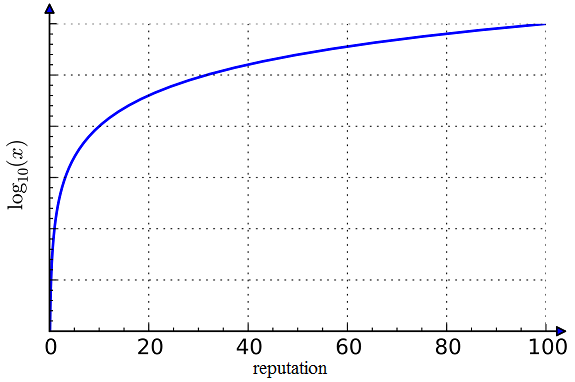Someone who is quite new on Hive, very active, and a quick learner, was wondering one of the last days how does the reputation score work on Hive in detail.
If he didn't find it (maybe he didn't look, I don't know) and he was interested in the subject, I assume the topic is important for many more newcomers who take the route of creating content on Hive.
A facile explanation of what reputation of an account represents on Hive is the score associated with the lifetime of payouts the account received. This explanation is easy to understand by anyone but also not entirely accurate in all cases, as you will see.
Given that the reputation score is more or less linked to the payouts received, it may not be the best indicator of someone's reputation on Hive. If an account receives regular whale upvotes - maybe regardless of the quality of their posts - the reputation score goes up quicker.
If someone doesn't post often but does a lot of important work for Hive, equally may have a lower reputation for creating content, but overall their Hive reputation in the community is much higher.
Also note that we may have whale accounts on Hive that have no reputation (i.e. reputation 25, the one you start with), and yet their wallet says a completely different story. Reputation doesn't say anything about these power users, who may or may not be active, for example by curating others.
If you vote on posts, that doesn't influence your reputation, but it does grow your curation rewards.
That being said, let's go into the details.
Reputation Score Is On a Logarithmic Scale
The reputation score is on a log (base 10) scale and it looks kind of like this:

@arcange is the source but I won't link the post, you might guess why.
Newcomers might've seen it's easy to level up your reputation score at first, and it becomes more difficult as time goes by (unless the support on your posts and comments increases significantly in time).
Everyone starts with a 25 reputation score, which is known as simplified reputation. The blockchain really keeps a very high number in its records that is known as the raw reputation. Reputation 25 is kept internally as 1 billion (1,000,000,000), for example. There is a formula to transform raw reputation into simplified reputation, but most people other than developers won't ever need it.
The reputation can go up through upvotes of others on your posts and comments, or down through downvotes. Nothing else affects the reputation score, as it is implemented now.
There is no fixed multiplier of how difficult it would be to progress from one level to the next, as I've seen speculated in the past. That's why it's a log function, it grows faster at first when it's easy and attenuates at higher levels, but the numbers still get astronomical then. For example, for level 26, one needs 1,291,549,665 raw reputation. For level 27, the requirement is 1,668,100,537. For level 75, the requirement is 359,381,366,380,463. Get the picture?
Reward Shares
When curators vote on your posts or comments, they earn reward shares determined by their HIVE Power, weight of vote, their voting mana (about to be changed in HF28), and when they voted. At payout, reward shares of everyone who voted on a post and of everyone who voted in general determine how the rewards are distributed.
How Does Reputation Score Change?
The reputation score changes based on the reward shares of curators AND their reputation. The first part is why it is said it is a metric of payouts received through the lifetime of an account.
However, the influence of the reputation of curators make it a slightly different metric than total payouts received.
This influence on reputation is taken in consideration when downvotes are cast. Here are the two special situations:
- negative reputation voters do not affect the reputation of others (but they do affect their payouts!)
- only accounts with a higher reputation than yours can affect your reputation through downvotes (so, receiving downvotes from lower rep accounts has no effect on the reputation score)
Conclusion
The reputation score gives at most an incomplete picture of someone's activity on Hive (but aren't all metrics incomplete?). Yet, since it is called reputation, it is the indicator newcomers would greatly value both when searching for new connections to make and as a number they probably want to boost as soon as possible, probably encouraged by how easy it is to level up at first.
I won't disregard its importance but I won't over inflate it either. It is one of the few elements of gamification Hive has embedded at the core level, so let's not throw it to trash. It can still be useful!
Posted Using InLeo Alpha